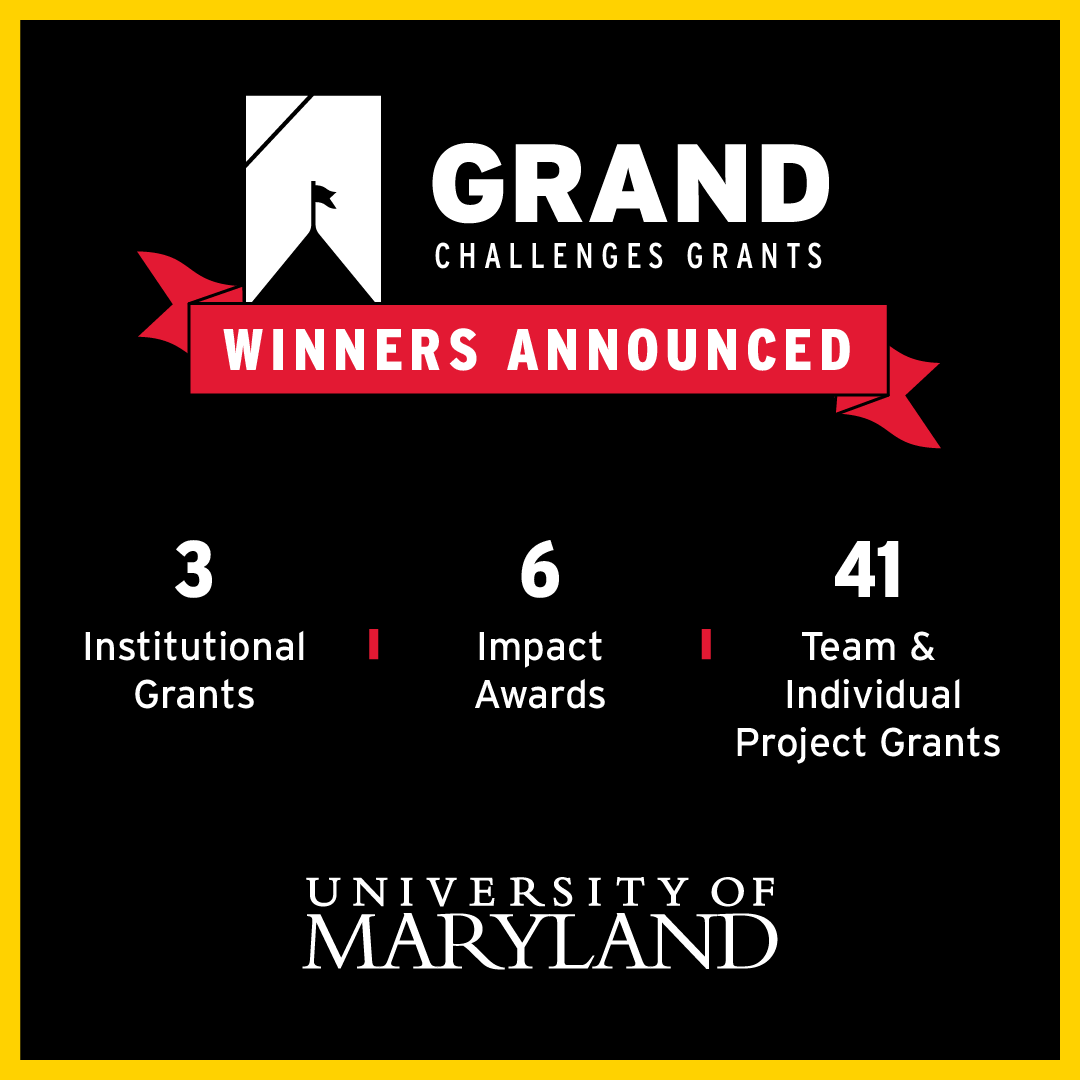COLLEGE PARK — With an unprecedented $30 million investment, the University of Maryland (UMD) is accelerating solutions to some of the world’s most complex problems, including climate change, global health, educational disparities, racial and social injustice, threats to democracy, pandemic preparedness, sustainability and many others.
 “Since day one of my presidency, I have charged our campus to tackle the grand challenges of our time by taking advantage of the brilliant work being done by our faculty and researchers across disciplines,” said UMD President Darryll J. Pines. “This historic investment gives Terrapins great hope and inspiration that while the challenges we face are grand, they are not impossible.”
“Since day one of my presidency, I have charged our campus to tackle the grand challenges of our time by taking advantage of the brilliant work being done by our faculty and researchers across disciplines,” said UMD President Darryll J. Pines. “This historic investment gives Terrapins great hope and inspiration that while the challenges we face are grand, they are not impossible.”
Through the Grand Challenges Grants Program — the largest and most comprehensive program of its kind ever introduced at UMD — a total of 50 projects encompassing disciplines all across the College Park campus were awarded funding in four categories:
- 3 Institutional Grants: Winners receive $3 million over 3 years
- 6 Impact Awards: Winners receive up to $500,000 over 2 years
- 16 Team Project Grants: Winners receive up to $1.5 million over 3 years
- 25 Individual Grants: Winners receive up to $150,000 over 3 years
"A fundamental goal of this grants program is to promote interdisciplinary work that addresses the complex problems facing humanity," said Senior Vice President and Provost Jennifer King Rice. “This collaborative approach allows us to realize novel insights and never-before-explored connections, which supports our overarching goal of creating meaningful solutions that advance the public good for our state and around the globe.”
Faculty members at the UMD Philip Merrill College of Journalism played leadership roles in two winning proposals, one that claimed an Impact Award and one that earned a Team Project Award.
Merrill College partnered with the UMD School of Public Policy, College of Behavioral and Social Sciences, and College of Education to win an Impact Award to build the Institute for Democracy Research, Education and Civic Action.
Taking on the grand challenge of strengthening democracy, the goals of the initiative are to expand research in such areas as civic engagement and voter trends; offer innovative teaching and learning opportunities for educators; and stage events to promote democratic participation.
The award funds the program with a grant of $200,000 per year for two years. Merrill College Associate Dean Rafael Lorente, Professor Sarah Oates and Visiting Professor Tom Rosenstiel are co-principal investigators on the project.
“The Grand Challenge Impact Award provides an opportunity for the Democracy Initiative partners to elevate and expand the impact of their existing work while developing the capacity to take on new challenges facing democracy in Maryland communities and beyond,” Merrill College Dean Lucy Dalglish said. “The mission is to conduct impactful cutting-edge research, identify evidence-based solutions and remove the barriers that threaten our future as a democratic nation.”
The initiative’s research efforts include a civic health assessment. It also includes plans for training educators to teach students how to be active, informed participants in a democracy, with a focus on detecting mis- and disinformation, and addressing the threats to democracy that result from news deserts and the demise of local news sources. Additionally, the award will allow the four colleges to collaborate on student-focused programming, such as voter preparation workshops and dialogues about constitutional questions.
Merrill College faculty members Constance Mitchell Ford, Sean Mussenden and Dr. Rob Wells collaborated with two faculty members at the Robert H. Smith School of Business to earn a Team Project Award for their research proposal, “Seizing Opportunities: Social Capital, Business & Communities.”
Tackling the grand challenge of how to foster a resilient and diverse economy, the team is looking to deepen the understanding of small businesses, which represent 44% of U.S. economic activity and create two-thirds of net new U.S. jobs.
The award funds the program with a grant of $125,000 per year for three years.
The two-pronged approach involves an analysis of small businesses by the Smith School followed by a journalistic project to share the findings with the widest possible audience, led by the Merrill College faculty members.
"Dr. Vojislav Maksimovic and Dr. Liu Yang, of the Smith School, have a cutting-edge research agenda to understand how social capital of small business owners affect their success,” Wells said. “We look forward to the opportunity to collaborate with Smith School finance scholars to explore why some small businesses thrive in underserved communities and why others fail.”
Additionally, Dr. Naeemul Hassan, an assistant professor jointly appointed by Merrill College and the UMD College of Information Studies, is part of a team that won an Impact Award for creating the Pandemic Preparedness Institute. The new institute integrates a broad array of social and behavioral sciences to learn from COVID-19 and other disasters to better prepare for future public health emergencies.
For more information, contact:
Josh Land
joshland@umd.edu
301-405-1321
